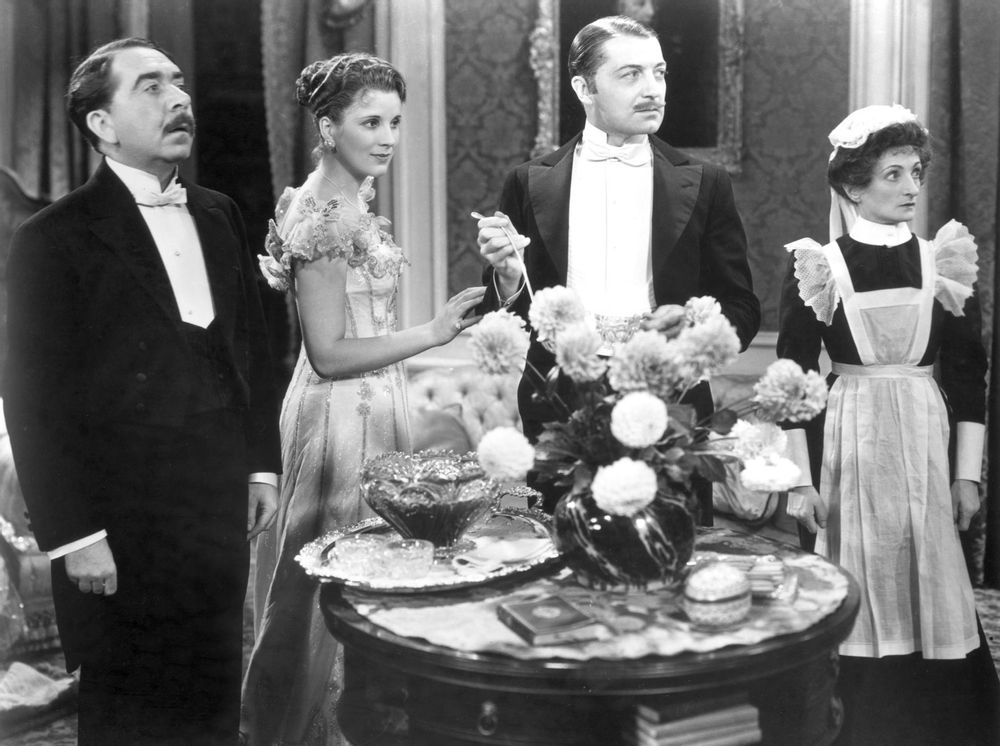
Cavalcade is a 1933 drama film adapted from a play by Noël Coward, directed by Frank Lloyd and starring Diana Wynyard and Clive Brook.
It tells the story of early 20th century England, from December 31, 1899 to December 31, 1932. The story centers on the upper-class Marryot family, headed by Robert and Jane (Brook and Wynward), and their servants, Alfred and Ellen Bridges. They go off to war—the Boer War and World War I—fall in love, get married, suffer death and tragedy, and take rides on the RMS Titanic.
Cavalcade was actually an American production, shot in Hollywood, although it featured a mostly British cast. It won three Academy Awards, including Best Picture and Best Director for Lloyd. From a latter-day perspective, it caused an Award Snub or three. Other nominees from that ceremony, such as 42nd Street and I Am a Fugitive from a Chain Gang, are better remembered today. (Meanwhile, the best-remembered film from that year, King Kong, wasn't even nominated.) In fact, Cavalcade might be the least well-remembered Best Picture winner ever, due in part to its sporadic home video status. It has only been released in the United States on DVD twice, as part of a 75th anniversary 20th Century Fox box set and in 2013 on an 80th anniversary edition Blu-Ray combo pack.
Cavalcade includes examples of the following tropes:
- An Aesop: War is bad.
- The Alcoholic: Turns out it was not a good idea for Alfred Bridges to leave service with the Marryots and go into business for himself by running a pub. He becomes increasingly belligerent and is killed when he wanders drunk into the street and is run over by a carriage.
- Alone in a Crowd: Just as the bells are ringing to celebrate the Armistice on Nov. 11, 1918, Diana gets the telegram announcing that her son Joe has been killed in combat. She wanders, dazed with grief, through the wild throng of people celebrating the end of the war.
- Ambiguously Gay: A montage illustrates the decline of Victorian morality standards after the end of the Great War. The most surprising shot in the movie is a glimpse of what appears to be a gay nightclub. A woman wearing a High-Class Glass is holding another woman's hand, and a man is putting a bracelet on another man's wrist.
- Book Ends: The film begins and ends with New Year's celebrations.
- The Chanteuse: Alfred and Ellen's daughter Fanny becomes a big star as a nightclub singer.
- Death Montage: World War I is illustrated with shot after shot after shot of British soldiers passing under the same bridge, superimposed with shot after shot of them being killed. Additionally, the landscape changes throughout the montage—at the beginning they are marching in bright daylight, while it is pitch-black and the landscape is blasted at the end.
- The Eeyore: Mrs. Snapper, Ellen's mother, is a real Debbie Downer. When Ellen is worried about Alfred coming home from the Boer War, Mrs. Snapper can only talk about all the people she knew who were killed fighting the Zulus, and the one guy who lost his legs in the Crimea.
- Family Drama: Love and death as seen through the eyes of the Marryots and the Bridges over 33 years.
- Foregone Conclusion: Maybe audiences in 1933 didn't know what was going to happen when newlyweds Edward and Edith are riding on an ocean liner on April 14, 1912.
- Happily Married: The ending finds Robert and Jane an elderly couple, with both their children dead, but still in love and still hopeful for the future.
- New Year Has Come: The film opens with the Marryot family celebrating New Year 1900 and ends with them celebrating New Year 1933.
- Progressive Era Montage: The years between 1918 and 1933 are portrayed rather negatively in a single montage that shows drinking, dancing, strident political demagoguery, and—horrors!—gays and lesbians.
- Stiff Upper Lip: Stiff Upper Lip: The Movie, as the characters face various tragedies with lips held very stiffly. Jane even has a particular pose where she turns her face up and to the left as she gets the Stiff Upper Lip in place.
- Tempting Fate: Edith Harris and Edward Marryot have a long,
 Anvilicious talk about how it would be OK to die as they'll never be happier than they are now, and then the camera zooms in on a life preserver labeled TITANIC.
Anvilicious talk about how it would be OK to die as they'll never be happier than they are now, and then the camera zooms in on a life preserver labeled TITANIC. - Time Skip: Several. 1901-1908 and 1918-1932 stand out.
